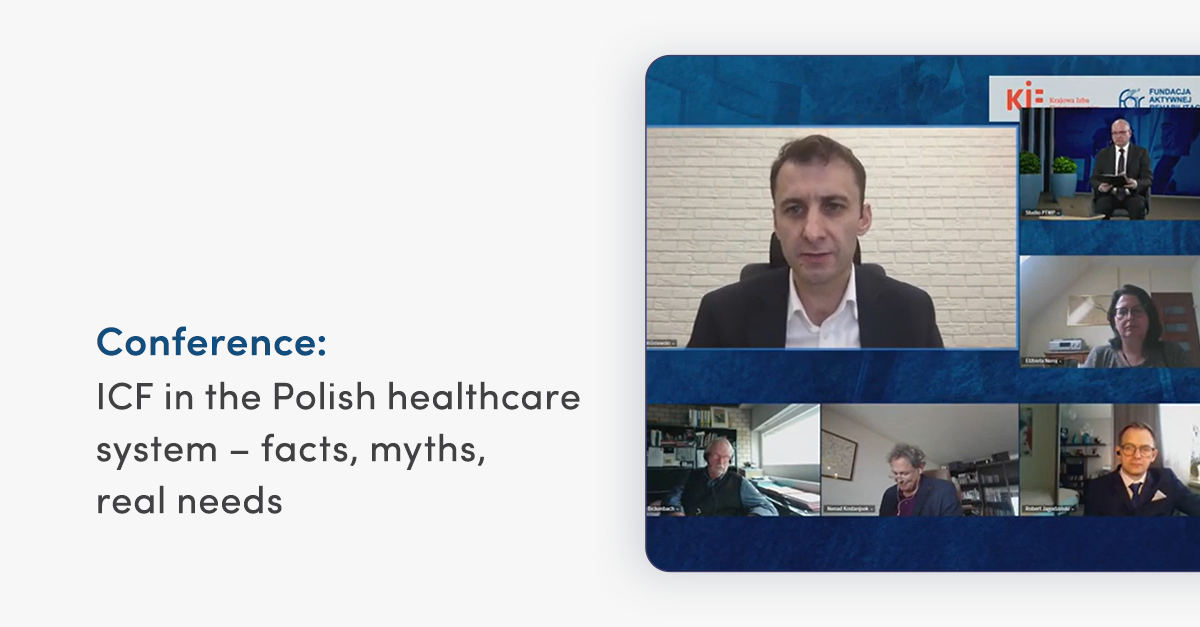
This May, exactly 20 years have passed since the publication of the International Classification of Functioning, Disability and Health (ICF). ICF is a commonly known classification used worldwide to describe the state of human functioning, but still, its use is often a problem and raises many challenges. World Health Organization emphasizes that functioning should be the third, next to mortality and morbidity, health indicator – based on ICF. The classification has been known for many years, but one of the probable reasons for its lack of widespread use across many levels is that it is a complex theoretical model that can be difficult and time-consuming to apply in clinical practice.
On May 27, at the initiative of the Polish Chamber of Physiotherapists and with the support of the Foundation for Active Rehabilitation, an online conference ‘ICF in the Polish healthcare system – facts, myths, real needs‘ was held. The aim of the meeting was to discuss the issue of meeting the functional needs of Polish society thanks to the common interpretation and uniform implementation of ICF-based tools, and consequently the integration of healthcare services with other public services in the field of social policy, education and the labour market. The benefits of the uniform implementation of ICF are related to the possibility of obtaining a full ‘description’ of a person, and thus – the ability to achieve the key goal of improving his functioning. We invited experts specializing in ICF, both from abroad and from Poland, to the debate. During the two-hour debate, among others, such topics were discussed:
- Main assumptions of the Rehabilitation 2030 initiative and the third health indicator – functioning. The benefits of ICF and WHODAS 2.0 use. – Nenad Kostanjsek – WHO Officer for ICD-11 and ICF Classifications, Terminologies and Standards, co-author of WHODAS 2.0;
- ICF in the healthcare system and its importance for the economic benefits of the country. – Prof. Jerome Bickenbach – Disability Policy and Implementation Science Unit Head, Swiss Paraplegic Research, Department of Health Sciences and Medicine at the University of Lucerne, WHO CC for Rehabilitation in Global Health Systems;
- ICF in education. – Elżbieta Neroj – General Counsel at the Department of Integrative Upbringing and Education, Ministry of Education and Science;
- ICF Best Practices. From healthcare to professional and social activation. – Robert Jagodziński – Vice-president of the Foundation for Active Rehabilitation;
- ICF in clinical practice. Implementation examples. Rehabilitation as an investment. – Ernest Wiśniewski – Vice-president of the Polish Chamber of Physiotherapists.
Among the invited guests were representatives of Ministry of Health, Ministry of Family and Social Policy, Ministry of Education and Science, Agency for Health Technology Assessment and Tariff System, Social Insurance Institution, National Health Fund, State Fund for the Rehabilitation of the Disabled, Central Institute of Labor Protection, as well as representatives of universities and World Physiotherapy and WHO.
We are of the opinion that the dissemination of the ICF is extremely important and necessary, but in order to be effective and bring the expected results, it must be fully understood and in inter-ministerial cooperation on many levels. Therefore, the conference was held among representatives of various institutions with whom the exchange of experiences and good practices is crucial. Joint and uniform implementation of the ICF to the Polish healthcare system, as well as other public services, must be coordinated. The experts’ discussion showed how important it is to introduce a universal language that enables the transfer of information about the state of human functioning in medical, social and educational systems. During the debate, it was also discussed what should be done to make the catalogue of real benefits resulting from the systemic introduction of ICF as comprehensive as possible.
Watch the recording in English: https://youtu.be/v1QTmajQn2M
Conference agenda:
Opening – dr hab. n. med. Maciej Krawczyk, president of the Polish Chamber of Physiotherapists
Presentation of guests – Wojciech Kuta, editor-in-chief Rynek Zdrowia Magazine
Rehabilitation 2030 Initiative and the benefits of ICF and WHODAS 2.0 – Nenad Kostanjsek, World Health Organization
ICF in healthcare systems and its importance for economic benefits – prof. Jerome Bickenbach, ICF Research Branch
ICF in education – Elżbieta Neroj, Ministry of Education and Science
From healthcare to professional and social activation – Robert Jagodziński, Foundation for Active Rehabilitation
ICF in clinical practice and examples of implementation – Ernest Wiśniewski, vice president of the Polish Chamber of Physiotherapists
Discussion. Q&A session.


